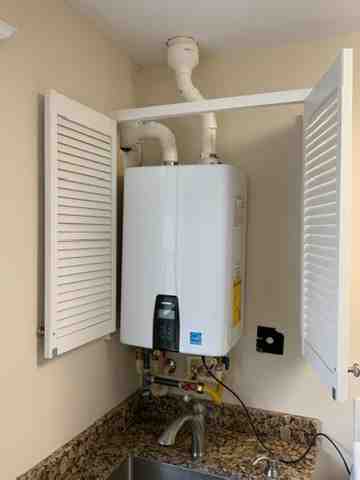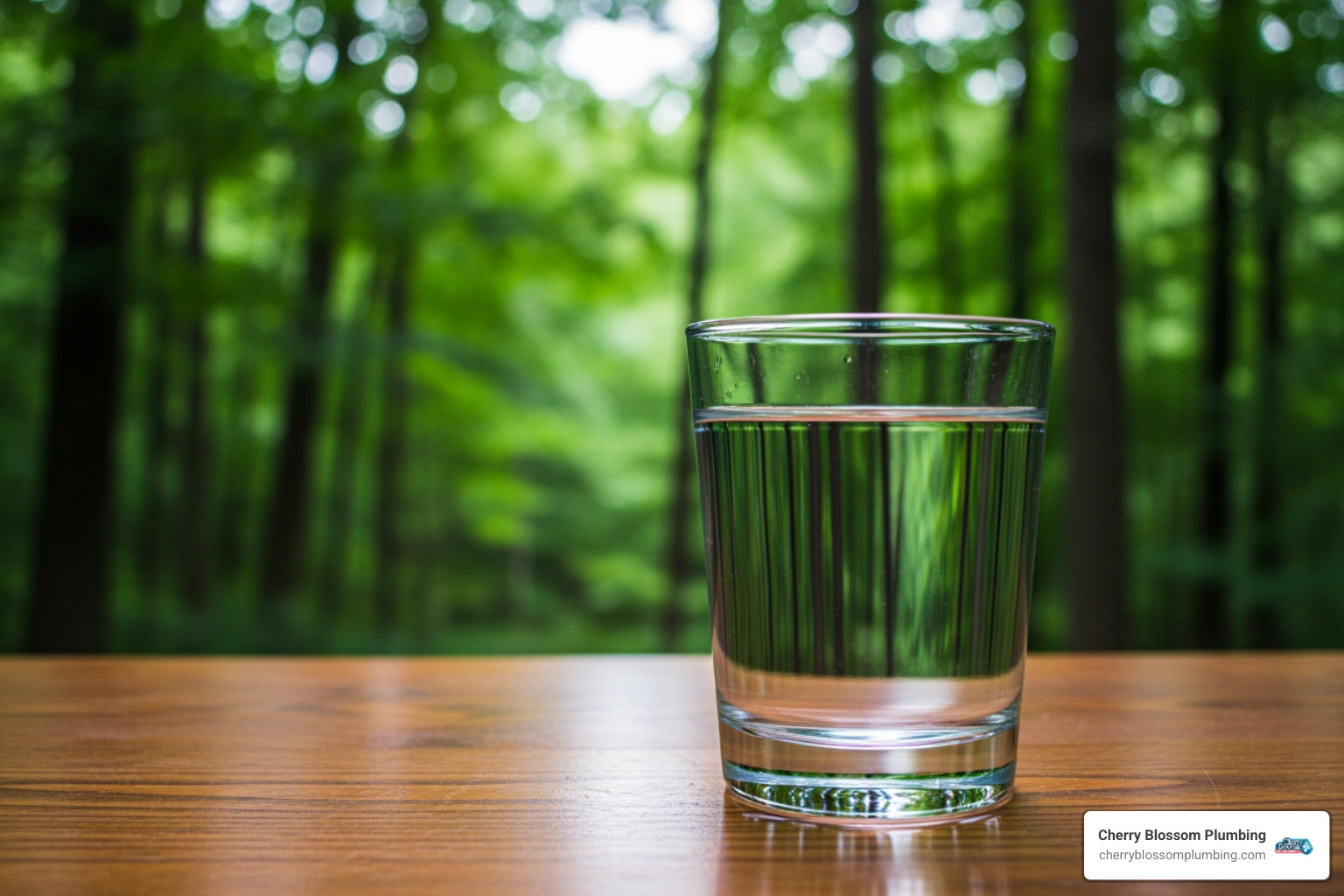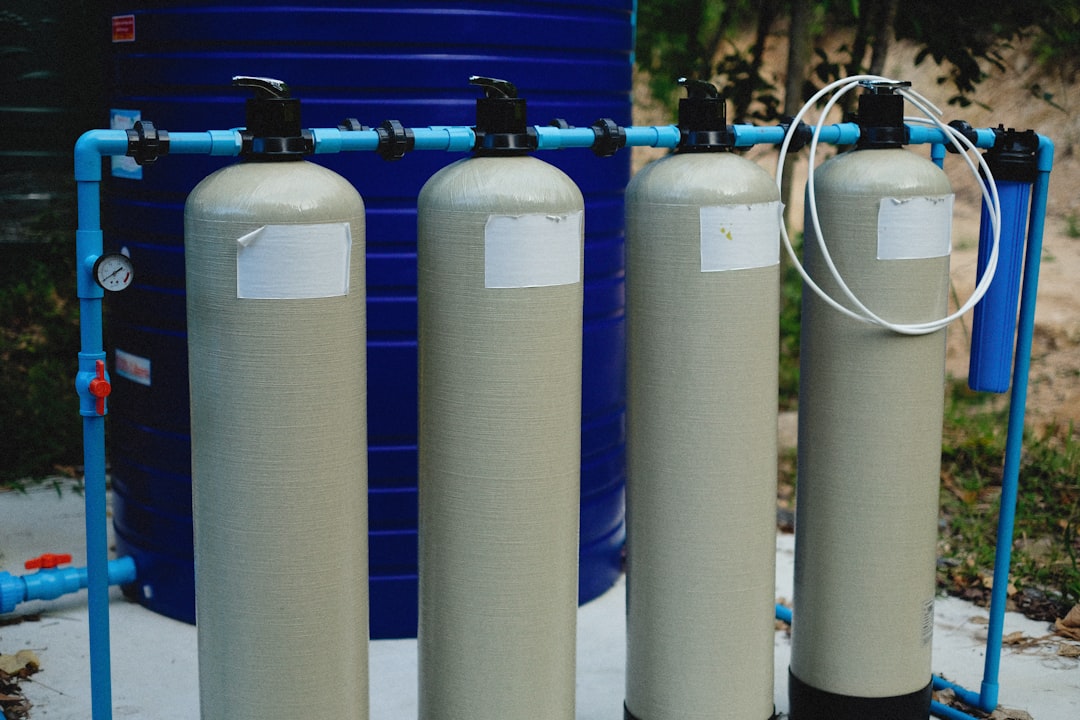
What's Really Coming Out of Your Faucet?
Whole house water filtration systems treat all water entering your home at its point of entry, providing clean, filtered water to every tap, shower, and appliance.
Quick Answer for Whole House Water Filtration:
- What it is: A system installed at your home's main water line that filters all incoming water
- Main types: Sediment filters, carbon filters, and specialized media systems
- Key benefits: Removes chlorine, sediment, and contaminants; protects plumbing and appliances
- Best for: Homes wanting clean water everywhere, not just at the kitchen sink
- Lifespan: Tank systems last 3-10+ years; cartridge systems need replacement every 6-12 months
If your water has a bad taste, unpleasant odors, or leaves stains on fixtures and laundry, you're not alone. A recent USGS study found toxic PFAS "forever chemicals" in almost half of U.S. tap water supplies. Even more concerning, at least 23% of private wells had one or more contaminants at levels of potential health concern.
The reality is simple: If you don't have a filter, you are the filter.
Municipal water treatment plants make water safe, but they don't remove everything. Arlington's water, for instance, contains more chlorine than a swimming pool. While this kills bacteria, it means you're showering, cooking, and drinking chemically treated water daily.
Your skin absorbs what's in your shower water. Your coffee tastes like your tap water. Your appliances work harder when they're fighting mineral buildup and sediment.
I'm Amanda Casteel of Cherry Blossom Plumbing. I've helped countless Northern Virginia families improve their water with whole house water filtration systems. Seeing how these systems protect health and home infrastructure, I'm passionate about helping homeowners understand their options for cleaner, safer water.

The Comprehensive Benefits of Filtering Every Drop
Imagine stepping into your morning shower and feeling softer water on your skin. Your hair isn't stripped and dry. The first glass of water from your kitchen tap tastes good - no chemical aftertaste or weird smell. This isn't a luxury spa experience; it's what happens when a whole house water filtration system treats every drop of water entering your home.
The most immediate change is better-tasting and smelling water. The chlorine odor is gone. The metallic taste that ruins coffee is history. Municipal plants use chlorine for safety, but you don't need it in your home. A whole house system removes chlorine and other compounds affecting taste and odor, so everything from drinking water to ice cubes tastes cleaner.
But the benefits extend far beyond your drinking glass.
Showering in filtered water benefits your skin and hair. Unfiltered water has chlorine that your skin absorbs and you inhale as steam, leaving skin dry and hair brittle. A whole house water filtration system removes these harsh chemicals, making your skin feel softer and your hair shinier.
Your plumbing and appliances get protection too. Sediment, rust, and mineral buildup attack your pipes and appliances. They reduce water flow, clog fixtures, and create scale that forces your water heater to work harder and fail sooner. Your washing machine, dishwasher, and ice maker all suffer from processing dirty water.
A whole house system acts as a bodyguard for your plumbing. By filtering out damaging particles, you extend the lifespan of expensive appliances and keep your plumbing running smoothly. No more scrubbing mineral stains off faucets or replacing water heater elements due to scale buildup.
The peace of mind is worth it. You know every tap, shower, and appliance in your home gets clean, filtered water. It's a protective shield for your entire water supply.
For more details on why water treatment matters for your home's health and longevity, check out our guide on the Importance of Water Treatment.
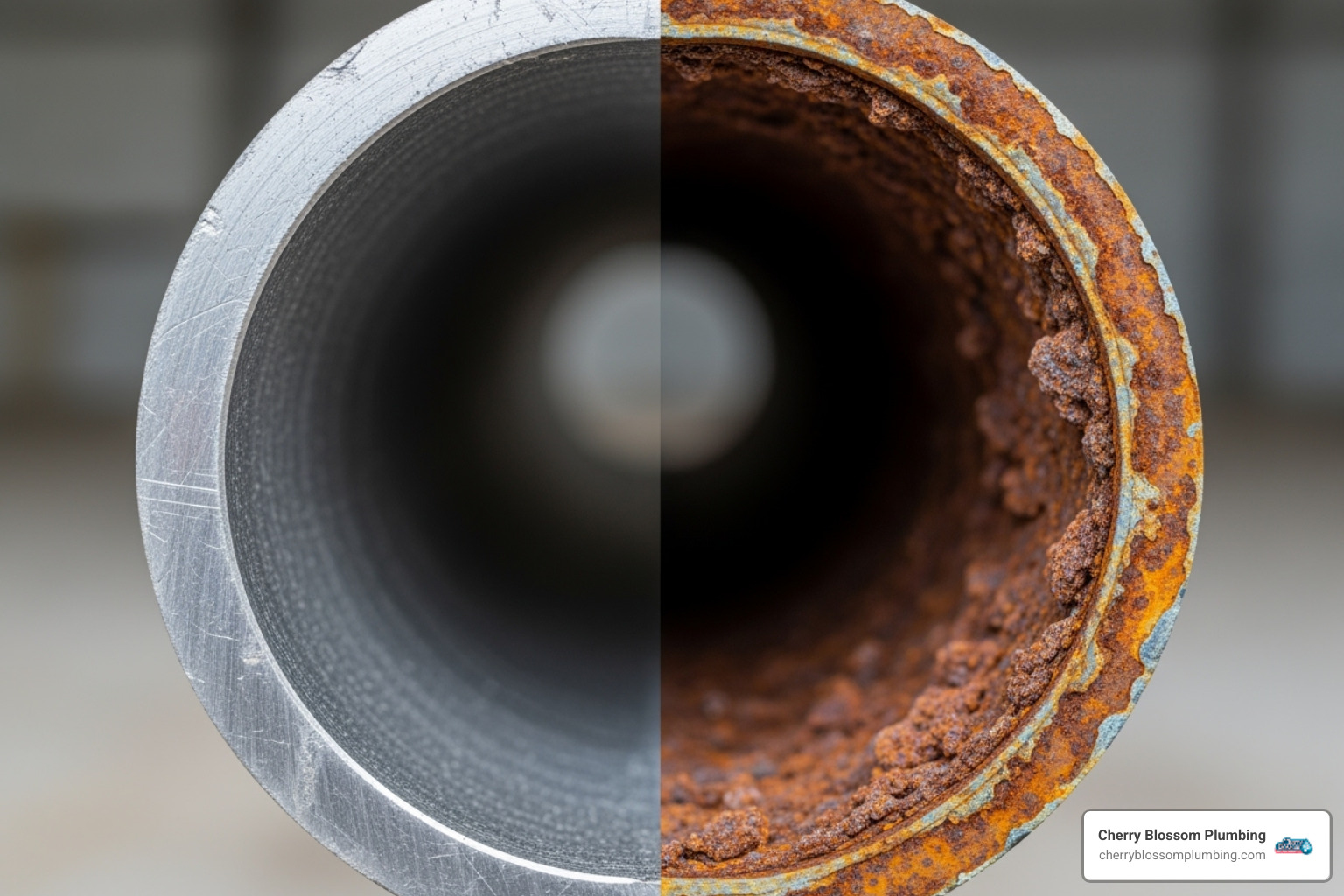
Understanding the Main Types of Whole House Water Filtration
Understanding the types of whole house water filtration systems is the first step to cleaner water. Every Northern Virginia home and water supply has unique challenges, requiring the right filtration approach.
Think of water filtration like a security system with different layers for different threats. Sediment filters are the first line of defense, catching large particles like sand, rust, and dirt that cloud water and clog pipes. They have micron ratings; a smaller number means finer filtration. For instance, a 5-micron filter captures much smaller particles than a 50-micron one, providing clearer water.
Carbon filters are workhorses for improving water taste and smell. Using activated or catalytic carbon, they remove chemicals like chlorine, chloramines, and volatile organic compounds (VOCs) that cause unpleasant tastes. If your water has a chemical taste, a carbon filter is the solution.
For tougher problems, specialized media filters are needed. If you have orange iron stains or a "rotten egg" sulfur smell, these systems use media like manganese greensand or Birm to target those specific minerals. They can eliminate stains and odors by handling high levels of iron and hydrogen sulfide.
The most effective approach is a multi-stage system, combining these technologies. It's like a relay race where each filter stage removes different contaminants. A typical setup might be sediment filtration, then carbon treatment, and finally specialized media, all working together for the cleanest possible water.
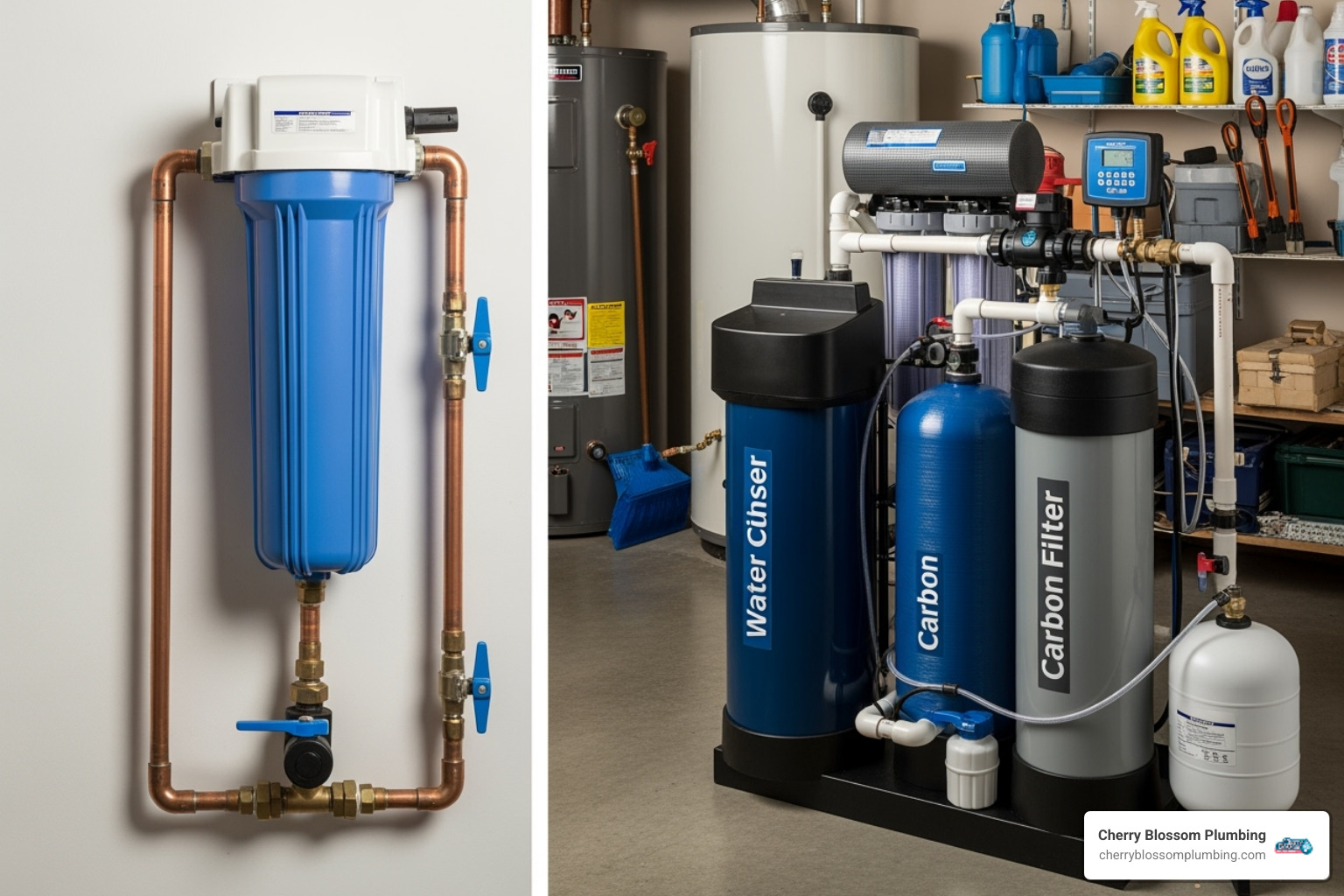
Systems for Municipal Water vs. Well Water
Your water source dictates the right whole house water filtration system. City water in Falls Church presents different challenges than a private well in the countryside.
Municipal water is treated to meet safety standards, but this often involves chlorine and chloramine. These disinfectants can make water smell like a pool and leave skin dry and itchy. Chloramine is particularly persistent and can be hard on plumbing over time.
Additionally, disinfection byproducts form when chlorine reacts with organic matter. And a recent USGS study found PFAS "forever chemicals" in nearly half of U.S. tap water. Municipal plants were not designed to remove these persistent chemicals.
For city water, carbon-based systems work beautifully. They excel at removing chlorine compounds and improving water taste and smell. If you're in the Alexandria area and want to understand more about local water challenges, our team has extensive experience with Water Filtration in Alexandria, VA.
Well water is different. Private wells aren't EPA-regulated, so water quality is the owner's responsibility. Common issues include sediment (cloudy water), and iron and manganese (rust-colored and black stains).
Sulfur creates a "rotten egg" smell, while a lack of disinfection means bacteria and viruses can be health concerns. A USGS study on private wells found that over 23% had at least one contaminant at a level of potential health concern.
Well water usually needs a multi-stage approach: robust sediment filtration, then specialized media for iron, manganese, and sulfur, and often a UV sterilizer for biological contaminants. Since every well is different, comprehensive water testing is essential.
How a whole house water filtration system works
A whole house water filtration system treats all water at a single Point-of-Entry (POE) before it spreads through your home. This means every faucet, showerhead, and appliance receives clean, filtered water.
We install these systems on the main water line, usually before the water heater. This protects the heater from sediment and scale and ensures you don't shower in hot, chlorinated water, which can irritate skin.
Once installed, water passes through a multi-stage filtration process. Like a car wash for water, each stage handles different contaminants. It might start with a sediment filter for large particles, then move through carbon or specialized media to remove chemicals.
Maintenance depends on the system type. Tank-based systems are low-maintenance, using automatic backwashing to flush out contaminants. The filter media can last 3 to 10+ years (up to 1,000,000 gallons), acting like a self-cleaning system.
Cartridge-based systems use replaceable filters that need changing every 6-12 months. They require more hands-on maintenance but can be more budget-friendly upfront.
A well-maintained whole house water filtration system can last 10+ years. Regular maintenance, like replacing cartridges or allowing for backwashing, is key to smooth operation and clean water. For more information about comprehensive filtration solutions, check out our guide to Water Filtration Systems for Homes.
Key Factors in Choosing Your System
Choosing the right whole house water filtration system isn't a guessing game. Like buying a car, you need to match it to your needs. At Cherry Blossom Plumbing, we know that understanding your specific needs upfront saves future frustration and money.
The foundation of a good filtration decision starts with water testing. You can't treat what you don't know is there. A professional test reveals specific contaminants, their levels, pH, and hardness. While a local Water Quality Report is useful for municipal water, it's not specific to your home's pipes. For well owners, testing is essential due to the lack of public oversight.
Next, consider your home's flow rate in gallons per minute (GPM). This ensures your filter doesn't reduce water pressure. Most systems we install handle 8-16 GPM, sufficient for typical family homes. A properly sized system can keep up with simultaneous use, like a shower and a dishwasher running at the same time, preventing weak water pressure.
Filter capacity indicates how long a system works before maintenance. Cartridge systems filter about 80,000 gallons (about a year's use) before replacement. Tank-based systems can filter 600,000 to 1,000,000 gallons over 3-10 years before the media needs changing. Higher capacity means less maintenance, a big plus for busy Northern Virginia families.
The micron rating indicates the smallest particle size a filter can catch. Ratings range from 0.5 to 50 microns; smaller numbers mean finer filtration. For example, a 5-micron filter captures smaller particles than a 20-micron one. This helps match the filter to the particles found in your water test.
Crucially, the system's contaminant removal capabilities must match your water's contents. If you have iron stains, you need an iron removal system, not just a carbon filter. For chloramines, catalytic carbon is more effective than standard activated carbon. This targeted approach solves your specific water problems.
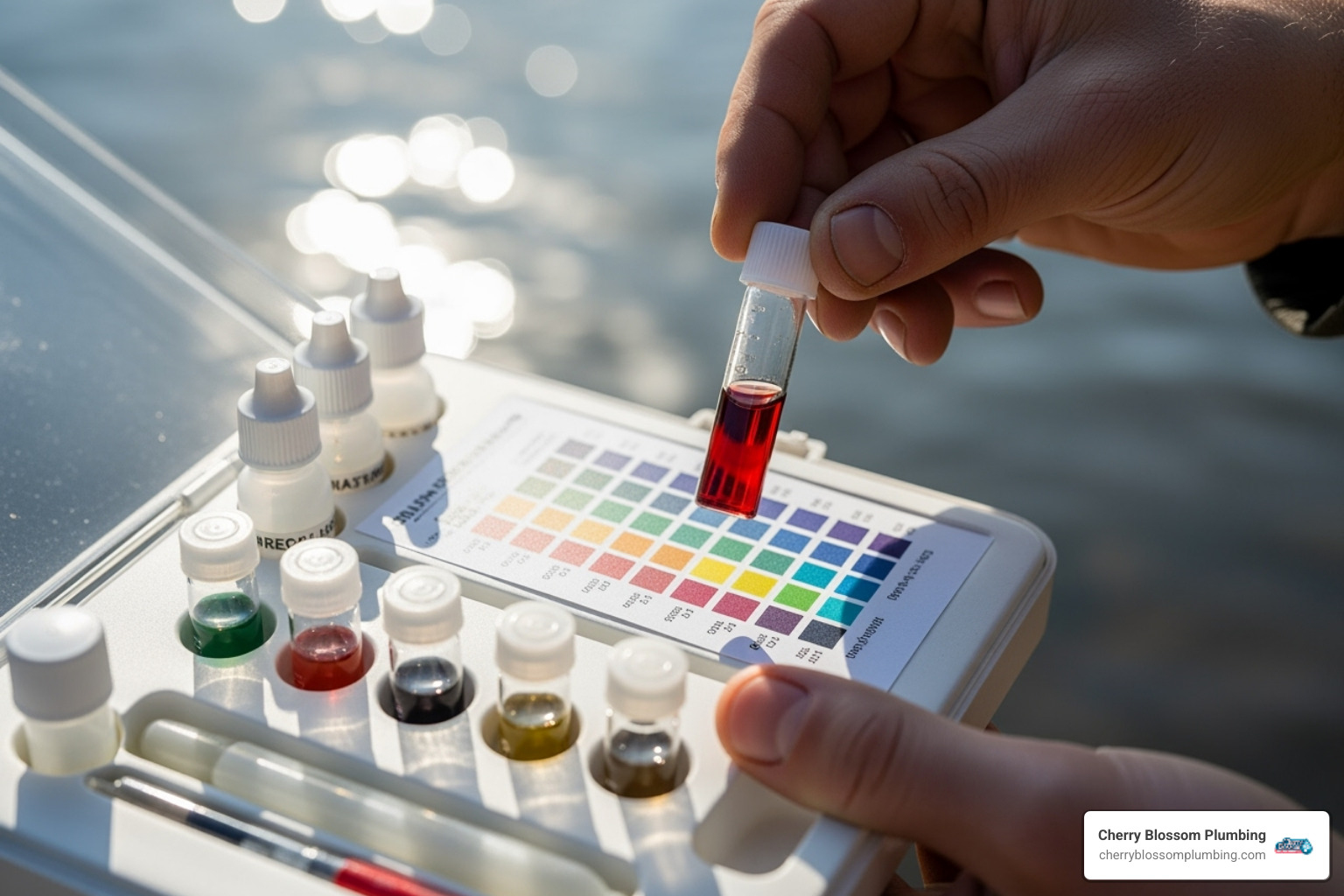
Choosing the right system doesn't have to be overwhelming. We've helped families across Northern Virginia make these decisions. For more detailed guidance, see our comprehensive guide on Choosing the Right Water Filtration System.
The Role of Certifications in whole house water filtration
When investing in a whole house water filtration system, you want proof it works, not just marketing promises. Certifications, especially from NSF International, provide this proof. They are like a seal of approval backed by rigorous scientific testing.
NSF/ANSI 42 certifies a system's ability to reduce "aesthetic effects" like chlorine taste and odor and cloudiness. If your water tastes like a pool, look for this certification.
NSF/ANSI 53 certifies the reduction of health-related contaminants like lead, cysts (Giardia, Cryptosporidium), and various volatile organic compounds (VOCs). This certification scientifically backs claims of removing harmful substances.
The newer NSF/ANSI 401 standard addresses "emerging contaminants" not yet regulated by the EPA. This includes some pharmaceuticals, pesticides, and chemicals like BPA.
Third-party testing matters because it provides independent verification. NSF certification means a system has been rigorously tested by independent labs and its manufacturing process audited for quality. It's proof that the system works as claimed.
We always emphasize choosing certified systems for our clients in Annandale, VA, and other service areas. Certifications remove guesswork and give you confidence in your investment. For more on local solutions, visit our page on Water Filtration in Annandale, VA.
Frequently Asked Questions about Water Filtration
Choosing a whole house water filtration system brings up plenty of questions. Here are the answers to the ones we hear most often from families in Northern Virginia.
What is the difference between a whole house filter and a point-of-use system like reverse osmosis?
A whole house water filtration system is like a security guard at your front door, protecting everything inside. A reverse osmosis system is like a personal bodyguard for just one tap.
A whole house system, installed at the main water line, treats every drop of water entering your home. This provides cleaner water for showers, laundry, and protects appliances like water heaters and dishwashers. These systems remove chlorine, sediment, and other contaminants affecting your comfort and home.
A reverse osmosis (RO) system, on the other hand, is installed under a sink to produce ultra-pure drinking water at that single tap. RO systems are thorough, removing dissolved solids, heavy metals, and other contaminants for exceptionally pure drinking and cooking water.
Many clients choose both: a whole house system for overall water quality improvement and an RO system for premium drinking water at the kitchen sink. This offers comprehensive protection and ultra-pure water where it's needed most.
For a deeper dive into finding the perfect combination for your home, check out our guide on the Best Water Treatment System for Homes.
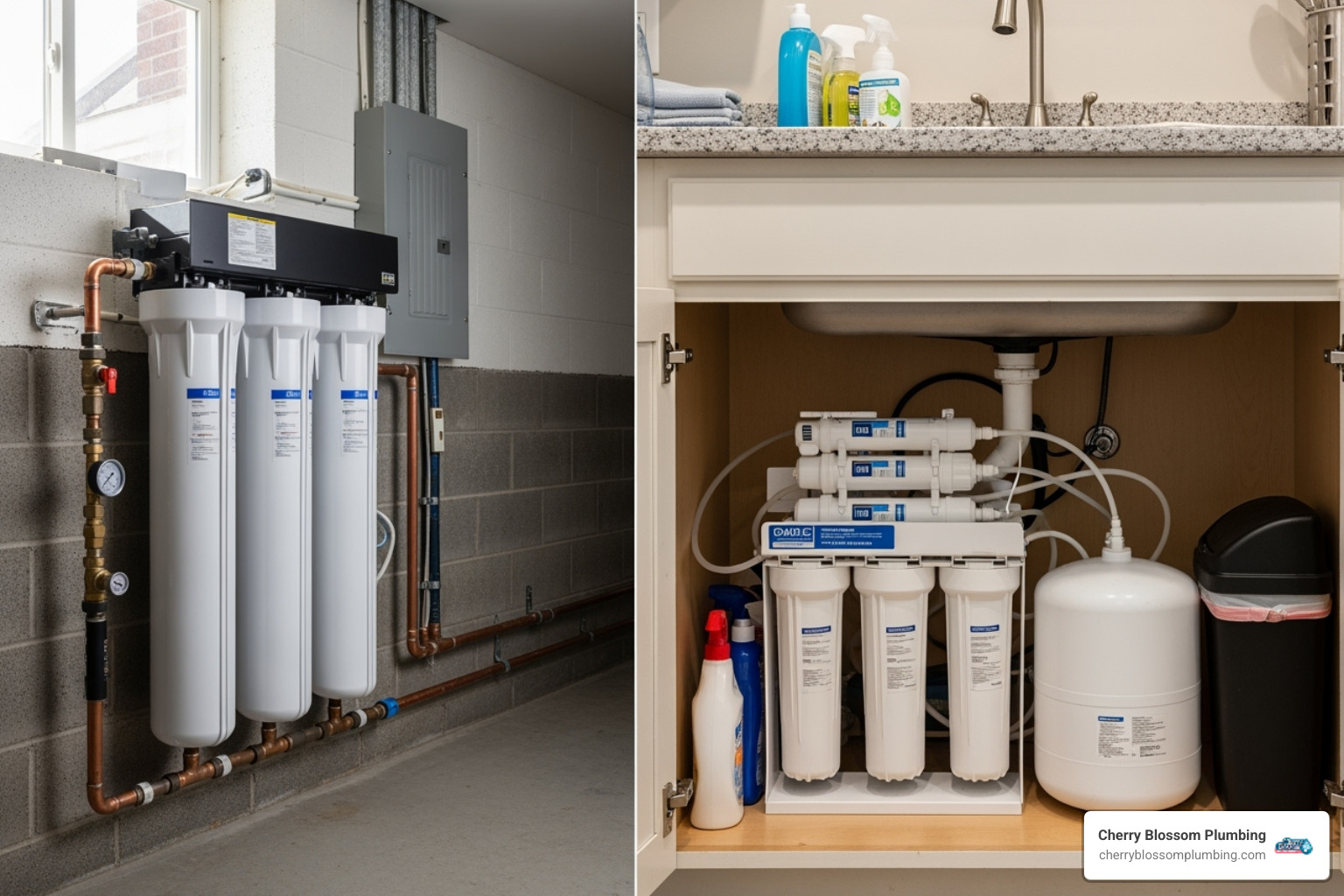
Will a whole house water filter reduce my water pressure?
Good news: a properly sized and installed whole house water filtration system should not noticeably reduce your water pressure. This is a common concern for homeowners.
The key is choosing a system with the right flow rate for your home. Modern systems handle 8 to 16 GPM or more, meeting typical household demands. We help you select a system based on your number of bathrooms, appliance use, and family's water usage.
Professional installation is also crucial. Our technicians use appropriate pipe sizes and positioning to minimize flow restrictions. DIY installations can cause pressure drops if done incorrectly.
Regular maintenance is also important for water pressure. Clogged pre-filters or saturated media can slow water flow. We recommend replacing sediment pre-filters every 6 to 9 months and following your system's maintenance schedule.
The bottom line? With the right system, proper installation, and regular maintenance, you'll enjoy clean, filtered water without sacrificing water pressure.
How long do the filters last and what maintenance is involved?
Maintenance for a whole house water filtration system depends on the type, but many are surprisingly low-maintenance.
Tank-based systems are very low-maintenance. Their filter media lasts 3 to 10+ years (over a million gallons). They feature automatic backwashing, which reverses water flow to flush out trapped contaminants, making them self-cleaning. The only hands-on maintenance is typically replacing a sediment pre-filter every 6 to 9 months. This protects the main system and extends the media's life.
Cartridge-based systems need more attention but are manageable. Cartridges are replaced every 6 to 12 months, depending on water quality and usage. The process is usually straightforward.
Regardless of type, a well-maintained whole house water filtration system can last 10+ years. Following the maintenance schedule is key, much like changing the oil in your car, to ensure it runs smoothly for years.
Conclusion: Your Path to Purer, Safer Water
Knowing clean, filtered water flows from every faucet is more than a home improvement-it's an investment in your family's well-being. A whole house water filtration system transforms your relationship with water, from your morning coffee to your evening shower.
You'll no longer drink chlorine or shower in water that dries your skin. Your appliances will last longer without fighting sediment and scale. Your laundry will be brighter, and your dishes spotless. Most importantly, you'll have peace of mind knowing every drop of water in your home is clean and safe.
The path forward isn't overwhelming. While there are flow rates and certifications to consider, we're here to help. At Cherry Blossom Plumbing, we've helped many Northern Virginia families find their perfect water solution. We handle the complexity to get you the cleanest, safest water possible.
Your home deserves better than questionable water quality. A whole house water filtration system addresses chlorine taste, PFAS chemicals, and mineral buildup at the source. It's proactive protection that pays dividends in health, comfort, and home maintenance.
Ready to stop being your home's water filter and let a professional system take over? Our team is standing by to help you find exactly what's in your water and design a solution that fits your family's needs perfectly. Contact us to discuss your water treatment options and take the first step toward changing every drop of water in your home.
Customer Testimonials
Cherry Blossom Plumbing has consistently provided top-notch service, ensuring every issue is resolved efficiently and professionally.

Latest Blog Posts
Service Areas
Proudly serving Arlington and the surrounding Virginia communities with fast, reliable plumbing solutions you can count on.





